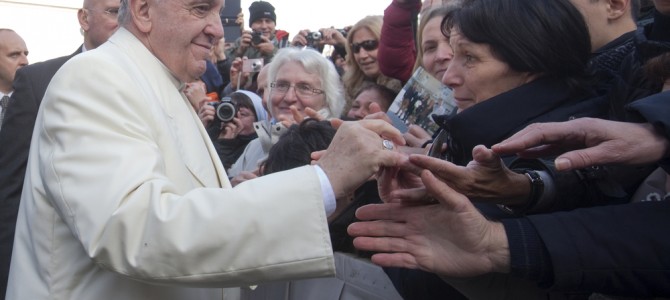
That a record number of people will attend this week’s World Meeting of Families in Philadelphia—nearly twice as many as attended the previous meeting in Milan—is something of a sign of the times: Marriage and family life are in crisis, and people are looking for answers.
Of particular concern is the millennial generation, many of whom were raised by divorced parents and bear the fallout of a sexual revolution that promised them freedom but instead is making it harder for a young adult to find and keep authentic love and commitment.
As I prepare to travel to Philadelphia for the event, I’m keeping in my mind a number of millennials I have been working with who are aching for an experience of marriage and family that is happy, healing, and lasting.
I’m thinking of Brittany, a single mom with two kids who has written that the “safe sex” Planned Parenthood marketed to her didn’t protect her from the heartache that came with realizing uncommitted sex would not bring the feeling of being known and loved like she had hoped.
There’s also Tyler, a young father whose chaotic upbringing led him to a life of drugs before meeting his now-fiancée, and his feelings of uncertainty about how to father their children. Then there’s Madeline and Zachary, a young married couple who are learning how to be husband and wife and mother and father by watching what not to do from their families of origin.
We Want Marriage—We Just Don’t Know How
For all the talk about millennials marrying less and later than ever before, their desire for marriage remains high, with more than 80 percent of them noting in surveys that lifelong marriage is an important goal in their life. The vast majority of them understand that marriage is a challenge—that is why many of them are prolonging it, because they don’t want to fail at it. But many of them also cite a desire for belonging, direction, to know and be known, to love and be loved.
From his encyclicals to his Twitter posts and everything in between, Pope Francis has consistently offered hope that marriage is a happy life, even amidst its challenges, and that it is possible for marriage to give life to those hopes of belonging and direction.
“How?” is the question young adults are asking, But the answers don’t just include what young adults could do for themselves. The answers depend on what individual Catholics, parishes, and dioceses can do to help young adults find and keep love, commitment, and marriage.
Pope Francis’ proclamation of a Year of Mercy and his consistent encouragement are especially important for helping young adults find and keep love and marriage—and particularly those on the margins, those not in our pews, universities, or other institutions.
Love Me Before You Criticize Me
People need to know they are loved before they can be challenged—that is the message of the Year of Mercy. My experiences of reading and listening to the stories of young adults at IBelieveInLove.com is that, for as much as millennials want love and marriage, some of them fear they have already done things too “backwards” or don’t have what it takes to make marriage last. Many are still reeling from the lack of a happy family life in their own childhoods.
In response, we have the opportunity to show young adults they are right to feel utterly betrayed by the breakdown of their family of origin. In addition, we need to approach sexually permissive dating habits with a spirit of understanding that our culture is more seeped in sex that we may realize, and that people’s participation in the hook-up culture sometimes comes from a lack of feeling loved and cherished in their childhood.
In that same spirit of love and mercy, we need to walk with young adults as they say, “I’m tired of hooking up,” “I’m tired of being isolated in relationships,” “I want more for my kids than I had as a kid.” Millennials need friends and mentors who will tell them “I feel your pain” while also saying “can I propose a different way?” They need communities—psychologists, doctors, employers, and neighbors—who will offer the same sort of mercy and care in their appointments, their management of employees, and their friendship in the neighborhood.
Pope Francis is suggesting a path of restoration that is person to person, heart to heart. The eagerness of Catholics to participate in the World Meeting of Families and the media attention being given to these events confirm in my mind that people are ready to take up these tasks of restoring marriage and family in America. In many ways, they’ve already begun.









